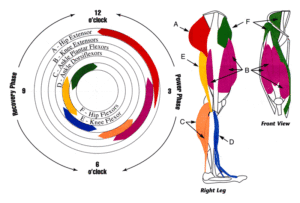
It will come as no surprise to you that you run 5k, 10k, HM, M distances slower than you normally would in a standalone event after you have just swam and biked at breakneck speed in the previous legs of the triathlon.
My personal experience is that I come in about 107% of my current standalone 5K time in a sprint triathlon. Sometimes slower, but very rarely more than 10% slower. As I go up the triathlon distances then the likelihood of that %age slippage increases FOR ME. But that is probably as a result of my better preparation for shorter distances.
A while ago I had a sporting DNA test completed by DNAFit and part of their results for me was that I was probably a better responder to anaerobic work than aerobic work – something that seemed to fit with my personal experiences. So it is quite possible that genetics play a difference for me favouring my better performances at shorter distances.
A similar level of performance ‘slippage’ is found amongst elite athletes. 105% apparently is considered good slippage.
Once again this illustrates the importance of the BIKE in triathlon.
Q: If your biking ability and your running ability were broadly equal then how would you focus your training?
Q: If you or your coach thought there were ‘easy’ biomechanical gains for you to make in running would you focus more time on running?
The generally accepted wisdom is that you are de-risking your race result by focussing a bit more on the bike in your training. Obviously if you are a notably poorer runner then you would focus on your obvious weaknesses.
But even amongst pro triathletes examples can be found where better standalone runners are NOT the best triathlon runners. They and their peers are all similarly trained to extremely high standards yet some just produce better running splits EVEN if they are not the best standalone runners.
I’m not sure that anyone quite knows precisely why. Fatigue will play a factor.
Pure fatigue just means you will be slower. But when you are fatigued it becomes harder to maintain your form. So there can be a cumulatively negative effect as your declining form eats up more and more energy for a given speed/pace as your form progressively worsens.
You would have thought that an excellent standalone runner would be better able to hold onto their running form after cycling but that is not always the case even amongst similarly trained individuals. So is there something happening on the BIKE that is probably causing this?

Have a look at: MUSCLE GROUPS USED IN TRIATHLON
Either way you probably need to do a bit more cycling 😉
On a related not I’ve seen some thoughts from some triathletes involved with STRYD coaches arguing for the emergence of new in-run metrics looking at the relationship between FORM POWER and PACE. ie for a given pace you want to make the power used to maintain your form as low as possible AND TO KEEP IT AS LOW as possible throughout a race. Vaguely similar to vVO2max, I suppose. ie your VO2max can be lower than mine but you would still beat me if your running economy was superior.
TAKE AWAY: The take away thing from this post is the 7% figure mentioned at the start. If you are at 15% you know what to do! (BIKE)
